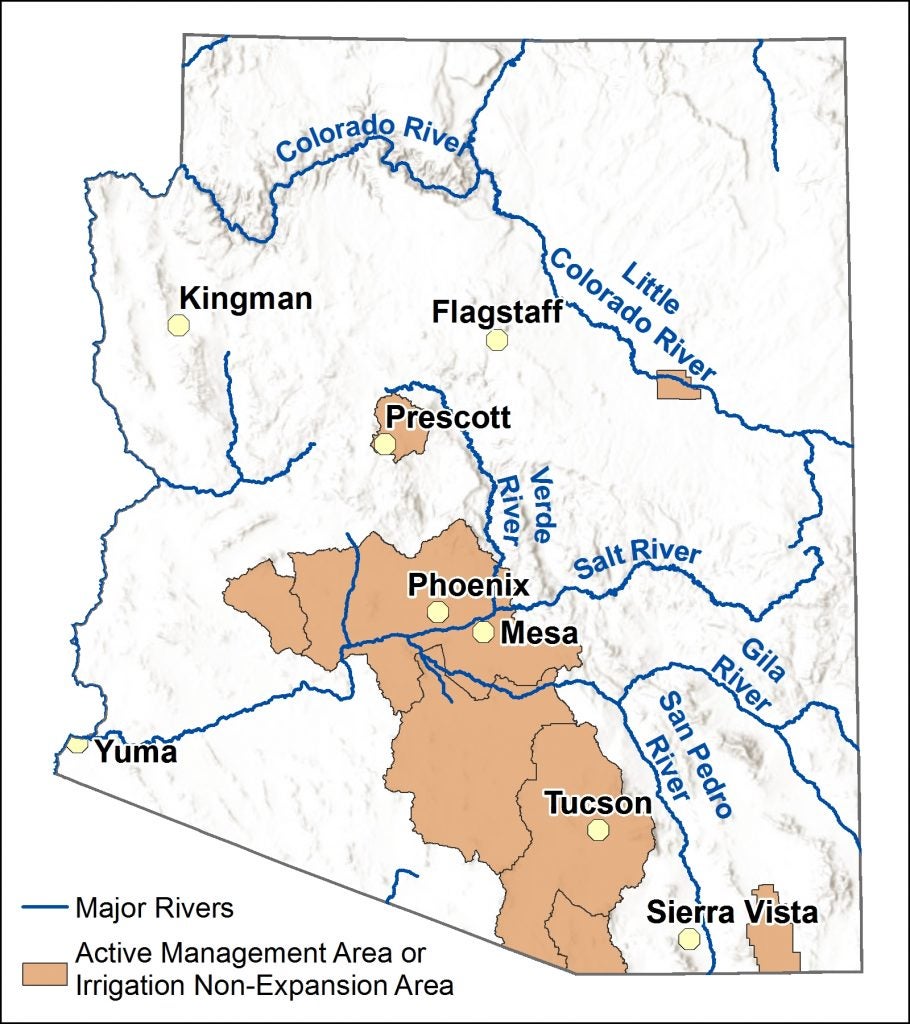Breakthrough reporting by the Arizona Republic widely exposed what is perhaps one of the state’s darkest water secrets: Groundwater pumping is essentially unregulated in nearly 80% of the state, putting the livelihoods and water supplies of up to 1.5 million residents at risk.
Groundwater is essential for life in the Southwest. It makes up about 40% of the water that Arizonans use each year. In many of the state’s rural areas, groundwater is the only available water supply.
Although Arizona regulates groundwater in and around Phoenix and Tucson, there are no limits on groundwater pumping in most of the state. As a result, more than a third of Arizona’s perennial rivers have been lost or altered; the city of Kingman’s main aquifer is projected to run out of water in 60 years or less; and residents in rural Arizona are already seeing their wells run dry.
Lack of oversight and transparency on groundwater pumping has left communities and rural citizens powerless to secure their water supplies.
Without action by the Arizona Legislature to address this crisis, rural communities will face ever-mounting groundwater challenges as populations grow, out-of-state mega farms move in and persistent drought continues. Fortunately, state leaders – both Republicans and Democrats – are now coming forward with legislation to tackle rural groundwater challenges.
A bill to support a locally driven, basin-by-basin approach
Some legislators are recognizing that a locally driven, basin-by-basin approach that considers a full menu of tools can help chart a new course to resilience and economic prosperity in rural Arizona. To make this approach a reality, though, the full Legislature must take action.
Rep. Regina Cobb, R-Kingman, recently introduced a bill, HB 2896, to support rural communities in creating tailored solutions to meet local water needs. The bill has drawn an impressive group of bipartisan co-sponsors: Reps. Leo Biasiucci, Walter Blackman, Isela Blanc, Frank Carroll, Kirsten Engle, Joanne Osborne and Bob Thorpe.

Groundwater in Arizona is regulated around Phoenix and Tucson, but unregulated in the rest of the state.
The bill would allow county boards of supervisors to create a rural management area (RMA) for at-risk groundwater basins, set local management goals and develop a management plan, which must be approved by the director of the Arizona Department of Water Resources. An RMA advisory board, composed of local residents, would be empowered to investigate and recommend solutions to meet locally determined water goals.
Potential solutions that an RMA may pursue, if approved by the director, include:
- Voluntary or mandatory conservation programs or best management practices.
- Voluntary or mandatory programs for metering, monitoring, estimating or reporting of groundwater withdrawals and uses.
- Programs to implement or incentivize groundwater recharge to mitigate the impacts caused by groundwater withdrawals.
HB 2896 signals the start of a new, solution-focused dialogue on rural groundwater challenges at the state Legislature. It takes a major step forward in creating a framework to provide local communities with the tools and support they need to secure their water future. Leaders are stepping up to ensure rural Arizona has a water-secure future. Will the state rally? Share on X
The Legislature must rally to support rural Arizona
Until now, a polarizing dialogue driven more by ideology and special interests, rather than solutions and the public interest, has prevented action on rural groundwater challenges.
By pursuing a solutions-oriented, locally driven and adaptable approach like that envisioned in HB 2896, Arizona can move past its legacy of inaction on rural groundwater issues and achieve a water-secure future for all residents, rivers and businesses.
We applaud Rep. Cobb and her co-sponsors for their dedication and for leading the way on addressing groundwater security – one of the most important issues facing Arizona in this new decade. We encourage other legislators to rally in support of Arizona’s rural communities and take action to empower them to secure their water supplies and ensure they have a prosperous, vibrant future.










3 Comments
I see so you are going to regulate personal water BUT give the ho ahead to frack and contaminate a closed aquifer on northern Az. Plus potentially polluted water down stream. Will someone please explain that one???!!!
I paid for my well not the state! I’ll don’t see how metering and charging me for my water on my property that I pay to pump is going to save any water. Seems to me it will only help make some politicians fat!
California did this. First, meter on well, soon $50 a month charge, finally a monthly water bill. We paid thousands to drill and set up a system, continual maintence that costs, electric bill, water testing fee, and on and on. Then they charge you for water. Where are they will you are paying for a new pressure tank and installation, a new pump, new electrical, etc. NO!